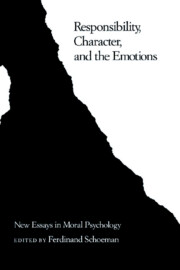Book contents
- Frontmatter
- Contents
- List of Contributors
- Acknowledgments
- 1 Introduction
- Part I Responsibility and Character
- Part II Responsibility and Culpability
- 8 The Moral Worth of Retribution
- 9 Nonmoral Guilt
- 10 Provocation and Culpability
- 11 Responsibility and the Limits of Evil: Variations on a Strawsonian Theme
- 12 Statistical Norms and Moral Attributions
- 13 Guilt, Punishment, and Desert
- 14 Intention, Foreseeability, and Responsibility
- Index of Names
10 - Provocation and Culpability
Published online by Cambridge University Press: 03 February 2010
- Frontmatter
- Contents
- List of Contributors
- Acknowledgments
- 1 Introduction
- Part I Responsibility and Character
- Part II Responsibility and Culpability
- 8 The Moral Worth of Retribution
- 9 Nonmoral Guilt
- 10 Provocation and Culpability
- 11 Responsibility and the Limits of Evil: Variations on a Strawsonian Theme
- 12 Statistical Norms and Moral Attributions
- 13 Guilt, Punishment, and Desert
- 14 Intention, Foreseeability, and Responsibility
- Index of Names
Summary
A perpetrator of a crime deserves reduced punishment, we commonly think, when the conduct has been provoked. Why so? An inquiry into provocation might shed light on the theory of culpability – and particularly, on the seldom considered question of extent of culpability.
Provocation typically involves situations where the defendant feels wronged by the victim – and responds in anger with the crime with which he or she is charged. The defendant is not warding off any immediate danger, however. Whatever harm was inflicted through the victim's misconduct has already occured, and may not have involved any physical threat to the defendant.
It cannot be said, in such a situation, that the defendant's conduct is justified. Self-defense against a criminal assault is justified, in that the injury inflicted on the aggressor is deemed the right (or at least a permissible) outcome: Where the actor must be injured if he does not hurt his assailant, the law deems it preferable that the assailant suffer. The provoked defendant, however, is not acting in self-defense, but only retaliating in anger after the provoking event. The actor might have exercised restraint without suffering further injury from the provoker.
If self-defense is not involved, could it be argued that the victim “had it coming” – that the act is justified or partially justified as a response the victim deserves? Surely not. Although the victim might deserve punishment, the actor lacks authority to inflict it. Penalizing malefactors is not a legitimate role for an individual; it is a state function, to be undertaken with appropriate due process safeguards.
- Type
- Chapter
- Information
- Responsibility, Character, and the EmotionsNew Essays in Moral Psychology, pp. 241 - 255Publisher: Cambridge University PressPrint publication year: 1988

